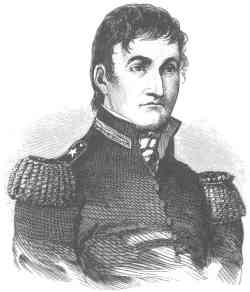John Coffee |
|
|---|---|
| Born | 6/2/1772 in Prince Edward County, Virginia |
| Died | 7/7/1833 in Florence, Alabama. |
Biography |
|
FamilyBorn in Prince Edward County, Virginia, Coffee the son of Lieutenant Joshua Coffee (January 26, 1744/1745-September 9, 1797) and Elizabeth Graves (1741/1742-1804), and the grandson of Peter Coffee, Sr. (about 1705-about 1771) and Susannah Matthews or Mathews (died before about 1795). John Coffee married Mary Donelson, who was the daughter of Captain John Donelson III and Mary Purnell, on October 3, 1809. John Donelson III was one of the elder brothers of Andrew Jackson's wife, Rachel. CareerCoffee was a merchant and land speculator. He and Andrew Jackson had been partners in Nashville merchandising just before Coffee married Jackson's niece. Jackson sold his partnership to Coffee before the wedding, taking notes for the sale. After the wedding, Jackson gave Coffee the notes as his wedding present to the couple. He challenged Nathaniel A. McNairy for publishing derogatory statements about Jackson. The duel took place on March 1, 1806, over the Tennessee line in Kentucky. During the course of the duel, McNairy unintentionally fired before the word, wounding Coffee in the thigh. In reparation, McNairy offered to lay down his pistol and give Coffee an extra shot. The weapons used in this duel were later used in the Jackson-Dickinson duel on May 30, 1806. At the beginning of the War of 1812, Coffee raised the 2nd Regiment of Volunteer Mounted Riflemen, composed mostly of Tennessee militiamen (and a few Alabamians). In December 1812, Governor William Blount had called out the Tennessee militia in response to a request from General John Wilkinson and the U.S. Secretary of War. Under Jackson's command, Coffee led 600 men in January 1813 to Natchez, Mississippi Territory, via the Natchez Trace, in advance of the rest of the rest of the troops, who traveled via flatboats. After the two groups reunited in Natchez, Wilkinson and the U.S. government disbanded Jackson's troops. All marched back to Nashville to disband, on the march during which Jackson earned the nickname Old Hickory. They arrived in Nashville on May 18, 1813. On September 4, 1813 Coffee was involved in the Andrew Jackson-Benton Brothers duel in Nashville, knocking Thomas Benton down a flight of stairs after Benton had shot Jackson. In October 1813, the 2nd was combined with Col. Cannon's Mounted Regiment and the 1st Regiment of Volunteer Mounted Gunmen to form a militia brigade of mounted infantry. Coffee was promoted to brigadier-general and placed in command. Coffee then led his brigade, which consisted largely of Indians and freed blacks, at the Battle of New Orleans, where they played a key role in holding the woods to the east of the redcoats' column. Coffee's brigade was the first to engage the British, firing from behind the trees and brush. General Coffee was again Jackson's chosen advance commander in the Creek War. Under Jackson's command, he led his brigade at: the Battle of Tallushatchee, the Battle of Talladega, and the Battles of Emuckfaw and Enotachopo Creek, where he was seriously wounded, and the Battle of Horseshoe Bend. Later lifeAfter the war and some failed investments, he began work as a surveyor, laying down the town of Florence, Alabama, and in 1816 he surveyed the boundary line between Alabama and Mississippi. He later moved to and died near Florence, Alabama. Coffee County, Alabama, Coffeeville, Alabama, Coffeeville, Mississippi and Coffee County, Tennessee are named in his honor. He signed treaties with the Chickasaw nation. in the 1830's. Research NotesResearchers often confuse this General John Coffee with General John E. Coffee the U.S. Congressman from Georgia. This John, also known as "Tennessee John" and John E. were first cousins. The two Find-a-Grave Memorials linked below, with additional state and spouse information, are for both Generals to help more clearly distinguish the two men. General John R. Coffee is buried in the Coffee Cemetery off SR 157 northwest of Florence, Alabama. This John Coffee is sometimes referred to as John R. Coffee. Some researchers are attempting to document the use of this middle initial in original sources. John signed his name John Coffee in original papers examined to date. The use of this middle initial must be assumed to be in doubt. |
|
 John Coffee (June 2, 1772 – July 7, 1833) was an American planter and military leader. He was considered the most even-tempered and least selfish of Jackson's lifelong friends. He was described as a big awkward man, careless of dress, slow of speech, but kindly, tactful and wise.
John Coffee (June 2, 1772 – July 7, 1833) was an American planter and military leader. He was considered the most even-tempered and least selfish of Jackson's lifelong friends. He was described as a big awkward man, careless of dress, slow of speech, but kindly, tactful and wise.